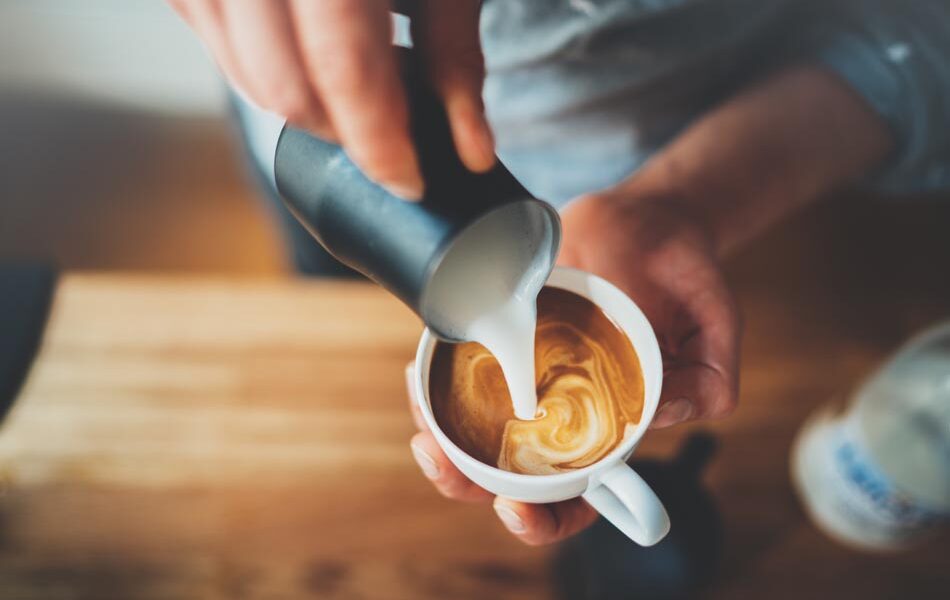Does Coffee Cause Bloating? Caffeine, Gastric Acid, and Gut Health
Whether it is your choice of coffee, what you add to it, or poor gut health, we have the answers to help you overcome coffee bloat.

A steaming hot cup of coffee is how many people start their day. However, some have to forego this daily routine because of the uncomfortable symptoms after drinking as much as one cup.
Belly bloat, indigestion, burping, and an urgent need to go to the toilet are common side effects of your favorite cup of joe. If you love drinking coffee, you may wonder why it’s a problem for you and what you can do to prevent these digestive issues.
Can coffee cause bloating? We looked at the research to find out if it is true, how coffee affects a sensitive digestive system, and what you can do to overcome the abdominal discomfort associated with your preferred hot beverage.
Does Coffee Cause Bloating?
Yes, coffee causes bloating for some people. It is common for your morning cup to trigger a bowel movement. Still, the side effects can be more uncomfortable for those people who are sensitive to the chemical compounds in coffee, including caffeine.
Coffee is an acidic beverage that can harm your digestive system. This is because it stimulates the release of gastric acid, which can result in indigestion and bloating.
Some people drink coffee with lemon, artificial sweeteners, or milk. All these can contribute to digestive discomfort if your body is sensitive to them.
Why Does Coffee Cause Bloating?
Coffee causes bloating because it stimulates bowel movements and the release of gastrin, which stimulates the release of gastric acid. Bloating when you drink coffee can also be the result of adding milk or artificial sweeteners to it.
Caffeine found in coffee has numerous effects on the human body. It is a diuretic that flushes water out of your body, can increase your heart rate and raise your blood pressure, and stimulates peristalsis in the digestive tract. For some, this results in painful spasms and bloating.
Acidic compounds in coffee stimulate the release of the hormone gastrin, which results in the secretion of hydrochloric acid into the stomach. As a result, coffee can irritate the digestive system causing symptoms of IBS, including bloating and abdominal pain.
If you regularly drink coffee with non-nutritive sweeteners, your caffeine habits could change the composition of your gut bacteria. When there is an imbalance in your gut microbiome, the microbes in your gut will produce more gas, and you will feel bloated.
Additionally, if you are drinking bulletproof coffee as part of your keto diet, the amount of fat in your coffee may be challenging for your digestive enzymes to handle. The undigested fat molecules are then broken down and fermented by the gut bacteria, forming gas in the intestine.
Can coffee on an empty stomach cause bloating?
Yes, if you have a sensitive stomach or irritable bowel syndrome (IBS), your morning cup may irritate your digestive tract. For example, drinking coffee on an empty stomach raises the level of hydrochloric acid in the stomach, stimulates peristalsis, and may cause belly bloat, which can be exaggerated when you haven’t eaten.
It is best to start your mornings with water or a cup of gut-friendly tea.
Although many people report adverse reactions to their favorite brew, scientific research has not established a link between your morning cup of coffee and bloating. So does coffee cause bloating? Only you can answer.
Why Does Coffee Make Me Burp?
Burping when you drink coffee is associated with the release of hydrochloric acid into your stomach and the effect coffee has on the lower gastroesophageal sphincter.
Coffee causes higher levels of gastric acid to be released and can cause stomach bloating and burping, two symptoms of gastroesophageal reflux.
Additionally, coffee affects the contraction of the lower gastroesophageal sphincter, the muscle that helps keep the stomach contents in the stomach. As a result, the stomach contents can move back into the esophagus, which can cause heartburn and belching.
How to Avoid Bloating From Coffee?
Bloating can be avoided even if you are someone who regularly drinks coffee.
Avoiding artificial sweeteners and drinking enough water throughout the day can reduce bloating. If you have lactose intolerance, you should stop adding milk or cream to your coffee. However, if you miss the creaminess dairy products add to your coffee, you could try using dairy alternatives such as oat milk.
You may find that limiting your intake of coffee to 2–4 cups per day or replacing your regular brew with alternatives such as green tea or a low-acid coffee could relieve your coffee bloat.
Research shows that coffee beans roasted for longer are less acidic and less likely to cause bloating. Cold brew coffee is also less acidic than your regular hot beverage, and studies suggest that larger coffee grounds result in a more tolerable cup of coffee too.
Taking care of your gut health may be one of the most important things to reduce bloating from coffee and other components in your diet. Taking probiotics can help, but eating food that provides the bacteria in your gut with sufficient fiber for them to flourish is crucial.
If you struggle to meet your daily fiber requirements (28g per day), you can increase the amount you consume by adding a fiber supplement to your daily routine. These supplements contain dietary fiber and can be consumed before or after a meal to overcome constipation and bloating.
A Word From a Nutritionist
Your daily coffee habit could give you a bloated belly. Although scientific research has not established a link between coffee consumption and symptoms such as bloating and burping, many people report suffering from these adverse effects when they drink coffee.
Caffeine stimulates bowel movements by increasing the strength and frequency of contractions in the digestive system. Some people are more sensitive to stronger peristaltic contractions and may feel bloated or experience abdominal pain, which are common IBS symptoms.
Compounds in coffee stimulate the release of gastrin, a hormone that results in gastric acid secretion. Higher stomach acid levels can cause bloating and other symptoms associated with GERD, such as heartburn and burping.
If your coffee routine includes milk, cream, or sweeteners, it may be the additions to your coffee that are causing bloating rather than the coffee itself. If you are lactose intolerant, avoiding milk and cream or using a daily alternative such as almond milk can reduce bloating.
It is equally important to ensure you drink enough water to maintain hydration between cups of coffee. Women are recommended to drink nine 8-ounce cups of water daily, and men consume thirteen 8-ounce cups daily.
Water works hand-in-hand with fiber to prevent constipation and bloating. However, fiber plays an even more critical role in gut health by providing fuel for the bacteria in your gut. You are less likely to suffer from digestive issues when there is a healthy balance of microbes in your intestines.
Conclusion
Many people report that drinking coffee causes bloating. This is because caffeine and the acidic compounds in coffee can irritate a sensitive digestive tract, causing bloating, pain, and discomfort.
Coffee bloat can also be the result of what you add to your coffee. Artificial sweeteners are known to cause abdominal discomfort when consumed in high quantities, and if you are lactose intolerant, milk and cream can cause coffee bloat. Avoiding them altogether or replacing them with suitable alternatives may offer some relief.
Coffee consumption can alter the balance in your gut bacteria. Your gut health suffers even more when your coffee habit includes non-nutritive sweeteners because they are known to impact the microbes in your digestive system.
Does every cup of coffee cause bloating? Not necessarily. Some people can tolerate small quantities of coffee. Still, if you love drinking coffee, a darker roast or larger coffee grounds may make it easier for you to continue enjoying your favorite hot beverage.

















































 Select your language:
Select your language: 










